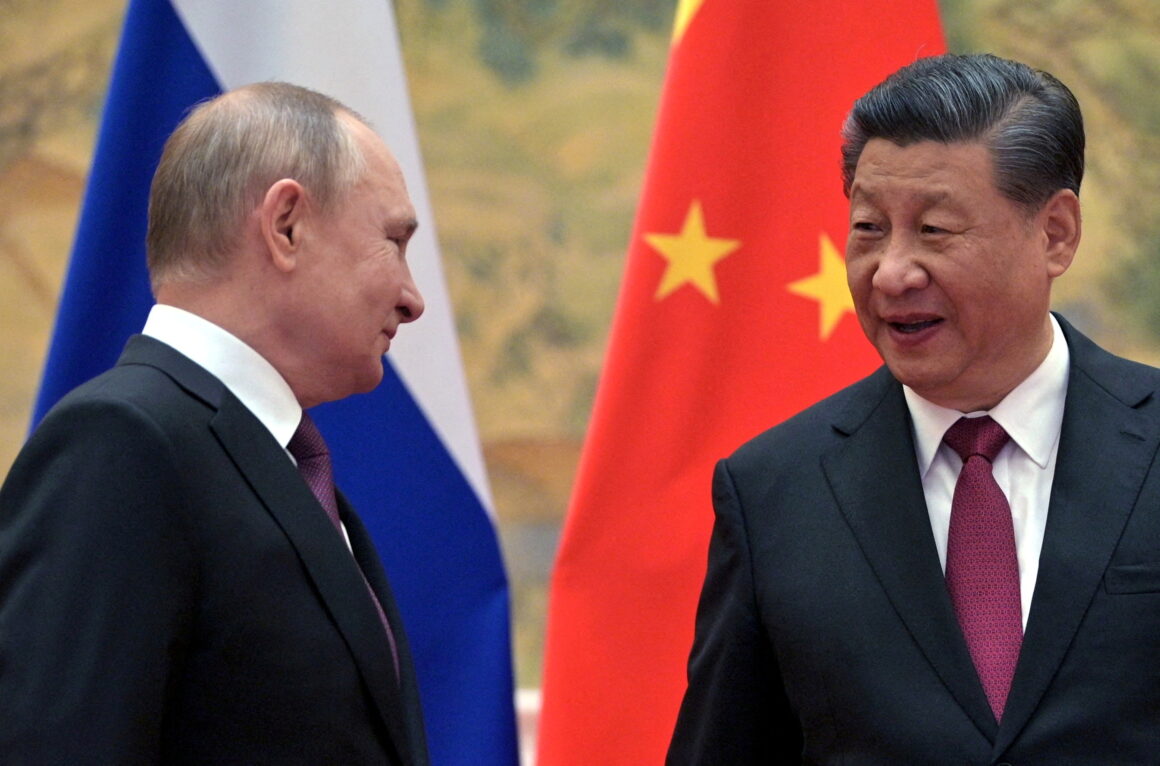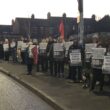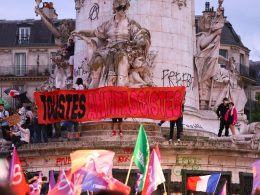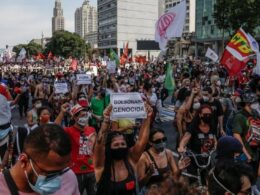By Vincent Kolo, Chinaworker.info, ISA in China
One who is not acquainted with the designs of his neighbours should not enter into alliances with them.” These are the words of legendary military strategist Sun Tzu more than 2,000 years ago. Xi Jinping clearly did not heed this advice when he unveiled his historic “no limits” alliance with Vladimir Putin at the opening of the Beijing Winter Olympics. This was just twenty days before Putin’s armies invaded Ukraine.
There is much speculation about what Xi and his inner core actually knew about Putin’s war plans. Were they kept in the dark? That seems unlikely. Did Xi, like Putin, bet on a quick and overwhelming Russian military victory? That seems very plausible. Did Xi know more, but fail to brief the rest of the CCP’s top leadership? That’s possible. Whatever the case, both dictators badly miscalculated. And such mistakes could ultimately threaten their hold on power.
There is a barely concealed split in the CCP regime (so-called Communist Party) and significant opposition to Xi’s pro-Putin line, which is reflected to some extent in the contradictory messages emanating from Beijing. As the veteran China analyst Katsuji Nakazawa has noted there are disagreements over the alliance with Russia within the seven-man Politburo Standing Committee, the CCP’s ruling body: “The seven are not on the same page”. Divisions over the war, and the fact that Xi’s economic policies have also partly been overturned, threaten to dial up the CCP’s internal power struggle.
This comes at the worst possible time for Xi as he seeks “stability” in the run up to the 20th Congress and his Putin-like coronation as lifetime dictator. The CCP’s anti-Xi faction headed by retiring premier Li Keqiang, who is backed by sections of the red capitalists and retired officials, is too weak to topple Xi, but their opposition to Xi’s policies has become more open. To implement policy in such an acute stage of crisis, Xi’s regime must be even more dictatorial and centralised. This creates a vicious cycle of instability.
“Great controversy”
“China cannot be tied to Putin and needs to be cut off as soon as possible,” wrote Hu Wei, a political scientist affiliated with the Counselor’s Office of the State Council (the government under Premier Li Keqiang). Hu’s essay was widely circulated to top leaders during the ‘two sessions’ (NPC and CPPCC) in early March, and was then deleted from the internet and blocked by censors. This document is significant for its unusually strident criticism of Xi’s position, not by name of course, and because its ideas evidently enjoy considerable support among top officials. Hu says the war has caused “great controversy in China” with opinion “divided into two implacably opposing sides”. He warns, “There is still a window period of one or two weeks before China loses its wiggle room,” to distance itself from Russia. “China must act decisively.”
Hu’s comments are the sharpest expression yet of divisions within the Chinese ruling class over Xi’s nationalistic ‘wolf warrior’ foreign policy, with the Xi-Putin alliance being its latest and most controversial installment. A significant section of the CCP officialdom and allied capitalist interests believe Xi’s nationalistic line has become increasingly counter-productive, harming the economy and reinforcing the anti-China narrative of US imperialism. But with Xi having put his personal stamp on the alliance with Russia, the Chinese regime has boxed itself into a corner. At most there may be a change of tone rather than substance. To “cut off” Putin, as Hu Wei advocates, would represent a serious blow to Xi’s ‘strong man’ persona, which has been studiously built up over the past decade.
How great Beijing’s difficulties become also depends on the course of the war. A long war, dragging on for months with increased terror-bombing of besieged cities, is a nightmare scenario for the CCP that would make its “fake neutrality” impossible to sustain. An even worse scenario for Xi Jinping would be the fall of Putin, either through a popular uprising or a palace coup, which would send shockwaves through China. For these reasons, while trying to manoeuvre and obfuscate, Xi’s regime will do its utmost to help Putin stay in power.
The contradictory official “neutrality” of the Chinese regime in this war has already damaged the authority of Xi, who tries to portray himself as a nationalist strongman who dares to stand up to the US. Externally, the CCP’s rhetoric towards Biden is vague and diplomatic, distancing itself from Russia, while its domestic propaganda promotes nationalism and is heavily pro-Russia. The sharp contrast has been noted by a certain layer of the masses, undermining Xi’s nationalist propaganda on one hand and at the same time exposing the hypocrisy of his global “peacemaker” image. A “great translation campaign” has been organised mostly by overseas Chinese to translate the arrogant nationalistic, racist and sexist commentaries of state-controlled media and social media into English. This campaign reflects the mood of a layer of Chinese disgusted by the CCP’s fraudulent propaganda.
Truman Doctrine
For Putin and Russian capitalism the Ukraine war may rank alongside the disastrous decision of US imperialism to invade Iraq in 2003. The US under Bush completely underestimated the ethno-political quagmire they were jumping into. Putin has misjudged everything from Russia’s military capabilities and the strength of Ukrainian resistance (he denounces Lenin’s teachings on the national question and is paying the price for this ignorance), to the world situation and the scale of Western imperialism’s reaction. Xi Jinping, by tying his regime so closely and publicly to Putin’s, has exposed China to the risk of diplomatic isolation and potentially devastating economic costs in the form of accelerated Western decoupling. This can happen regardless of whether China is officially targeted with sanctions as a result of its pro-Russia position.
ISA has explained that the Ukraine war has changed everything. The Financial Times, strategizing on behalf of Western capitalism, describes this moment as “a geopolitical pivot point”, and urges Washington to proclaim a new version of the 1947 Truman Doctrine (which divided countries into “for” or “against” US imperialism). In the short-term Russia’s invasion has strengthened Western capitalist governments who are embarking on ‘shock doctrine’-style militarisation, unprecedented state interventions in financial markets (the sanctions against Russia), and are meeting much greater success in disguising their policies as a defence of ‘democracy’ against ‘autocracy’.
The new Cold War between the US and China, which has been developing for several years, has therefore undergone a ‘Great Leap Forward’ since the Russian invasion began. More rapid economic deglobalisation is now inevitable. Russia’s invasion has at least in the short-term healed the internal divisions in the Western camp, between the EU on one hand and the US-led Anglosphere-bloc on the other. Japan’s former prime minister Shinzo Abe has called for US nuclear weapons to be stationed in Japan while Germany becomes the world’s third biggest military spender. At a stroke, the Ukraine war has wiped away the remains of post-1945 world order.
Disaster capitalism
This level of Western cohesion is something Chinese diplomacy has been working hard to prevent ever since the time of Obama and Trump. Putin’s war has therefore enormously facilitated Biden’s strategy of building a “democratic” imperialist coalition to pin back China and Russia. Xi’s de facto support for the Russian invasion has made it much easier for US imperialism to conduct a proxy war against China, as its main long-term target, under the cover of the conflict with Russia. The nature and scale of the Western sanctions against Russia are a crucial part of this proxy war.
The sharp escalation of conflict with Russia is inseparable from the US-China conflict. Biden has been pushing for a stronger alliance with Europe, especially through NATO, reversing the isolationist ‘America First’ policy of Trump. The aim is to isolate China in international politics and increase the pressure upon it in the contested areas of the Indo-Pacific, such as the South China Sea and Taiwan. In the long-term, Asia is strategically more important for US imperialism than Ukraine and Eastern Europe. All this means the Ukraine war is a rehersal for further global conflicts developing in future.
Socialists oppose Russia’s invasion and the imperialist agendas of Putin on one side but also NATO and US imperialism on the other. The horrific plight of the people of Ukraine is a warning of the horrors that await humanity under ‘disaster capitalism’, which on top of climate collapse and deadly pandemics now also raises the spectre of military conflicts between nuclear powers. We point to the heroic anti-war protests inside Russia and the need for working class internationalism, firstly in solidarity with the Ukrainian masses, but linking this to the need to fight the militarism and anti-working policies of all the capitalist governments. We refer our readers to the detailed socialist analysis of ISA published on internationalsocialist.net.
The actions and pronouncements of all the imperialist powers are cynical and dishonest. Putin flagrantly denies Ukraine’s right to exist as a nation state. Wang Yi tells the world that China, “firmly advocates respecting and safeguarding the sovereignty and territorial integrity of all countries,” but Chinese media only broadcasts Russian accounts of the conflict and refuse to use the word “invasion”. Biden, Johnson and Scholz are not driven by concerns for the Ukrainian people but of extracting maximum geopolitical benefit from Putin’s problems. Years of political manoeuvring by the US and NATO, with Ukraine’s right-wing capitalist government a useful pawn, helped to sow the seeds of war. Now NATO is prepared to “fight to the last Ukrainian”, applauding the courage of its resistance, but seeking to localise and contain the conflict — as shown by the saga of the “unwanted” Polish fighter planes.
China as a superpower
This is the most serious international crisis for the CCP regime since the collapse of the Soviet Union and the Stalinist dictatorships in Eastern Europe thirty years ago. This is the first such crisis with China as the number two superpower, closely challenging the US as an imperialist power with global spheres of interest, gigantic corporations, and huge investments to defend. In 1992, China was not even among the top ten economies worldwide. It was a low-profile bystander focusing on its own internal problems (completing the restoration of capitalism after crushing the mass revolt of 1989). Today, as the second largest economy, China is far more integrated into the global financial and trading system than Russia, the 11th largest economy. For Chinese capitalism, the threat of being shut out of Western markets by sanctions is far greater than for Russia.
Socialists oppose the sanctions, which are a tool of finance capital in the most powerful capitalist states and can be used against workers and socialist struggle in the future. In Hong Kong and Xinjiang, ISA opposed the Western sanctions warning they would not stop Chinese state repression but rather weaken and demobilise the mass struggle. The sanctions against Russia are immeasurably more powerful, but our opposition is not based on the intensity of the sanctions, rather on which class is wielding this power, to achieve what ends.
5.5 percent GDP growth?
While Ukraine burns, China stands to rack up massive economic losses, even if the CCP’s diplomatic acrobatics (supporting peace in words while protecting Putin in deeds) manage to shield it from US and Western sanctions. China is the world’s largest oil importer, importing 70 percent of its oil and 40 percent of its gas. With oil prices already up 60 percent in 2021, the price of oil has risen 11 percent since the Russian army crossed into Ukraine. Increased coal usage and even faster climate destruction will be the result.
China’s agriculture minister warned in March that this year’s wheat harvest “could be the worst in history” due to heavy rains. The country will need to increase its imports by around 50 percent, with global wheat prices surging 50 percent to record highs since the invasion. Together, Russia and Ukraine account for a quarter of global wheat exports, but sanctions and the war have cut off this supply from world markets. Skyrocketing global food prices threaten mass hunger and “bread riots” in many developing countries.
But it is the threat of secondary sanctions — being dragged into the US-led sanctions web that has been spun around Russia — that could potentially deal a severe blow to China’s economy at a time of seriously flagging domestic growth. At the National People’s Congress on 5 March, the government announced a 5.5 percent GDP target for 2022, the lowest target in almost three decades. Most economists doubt this can be achieved. The number appears to be more of a “confidence boosting measure” than an actual target — the IMF along with others forecasts 4.8 percent growth this year, but for the government to adopt anything below five percent would have been an admission of defeat, with real consequences.
Even without the dangerous economic ramifications arising from the war, China’s economy was facing serious problems: the slow-motion collapse of the property sector, rising unemployment, comatose consumer spending and the disruption of supply chains resulting from the citywide lockdowns imposed to defeat the spread of Omicron. Xi’s regime is committed to continue with its ‘dynamic zero-Covid’ policy, despite this method failing in Hong Kong, which now has over one million cases of Covid and the highest per capita death rate of any country in the pandemic. Morgan Stanley predict zero growth in the first quarter as a result of Omicron. China’s main driver of economic growth, the housing market, has been contracting for six months (both in terms of prices and sales volumes), despite a government u-turn relaxing credit controls, easing monetary policy and abandoning plans for a property tax that Xi had championed.
The CCP did not expect or plan for Putin’s war. The exact reasons why Xi’s regime lost focus so completely at such a crucial juncture in the Sino-US Cold War reveal a lot about the weaknesses and internal contradictions of the regime. The first Wuhan outbreak, Hong Kong’s mass revolt in 2019, Trump’s trade war in 2018 — Xi was caught off guard every time. In light of what has since transpired, the 5,000-word joint communiqué of 4 February announcing an upgraded “no limits” strategic partnership with Russia — “more than an alliance” in Xi’s words — has come back to bite him. It was the Chinese leader rather than Putin that initiated the new agreement, mainly to boost his own authority on the stage of the Beijing Winter Olympics, largely shunned or boycotted by world leaders (only 21 attended compared to 68 in 2008). For Xi, with his whole focus on extending his rule at the 20th Congress later this year, the Olympics was the equivalent of an election rally in a bourgeois democracy — all fireworks and patriotism.
“Like two brothers”
“It is significant for the top leaders to metaphor the two nations’ strategic partnership as ‘back-to-back’ — meaning the two countries, like two brothers, leave one’s own back to the other to defend…”, commented the CCP’s Global Times (13 February). Such rhetoric has not aged well. China’s diplomats now attempt to duck and weave to avoid being hit with Western sanctions as Putin’s “accomplice”. There is not so much new substance to the 4 February agreement — some repackaging and expansion of existing energy and technology deals between the two countries. The purpose was mostly messaging: a common front against the US. But with Putin on the cusp of launching the biggest European war in 80 years, Xi’s move was spectacularly ill-timed.
Xi gambled that his regime would gain from the military tensions in Europe, which would force Biden’s administration to shift its focus away from the Indo-Pacific and China. Like Putin, Xi probably calculated that the divisions between US imperialism and the EU, especially Germany, would widen. Furthermore, showing that the two dictators are not “brothers” and their alliance is actually one of tactical convenience, Xi saw advantages from Russia’s increased dependence on China as the dominant partner, a reversal of the situation in the 1950s Cold War when as Stalinist dictatorships, China was very much the junior partner to the Soviet Union. If Putin’s aggressive diplomacy and threats against Ukraine had succeeded, meeting only protests from Western capitalism (as was the case with Xi’s crackdown in Hong Kong), that would have boosted the CCP’s designs on Taiwan.
For these reasons, whether Xi was fully aware of the plans to invade Ukraine or not, he may have relished a situation in which China looked on while Putin created problems for the West. However, on 24 February all these supposed pluses turned to minuses.
Xi risks becoming the Chinese leader who “lost Europe”. Attempts through trade diplomacy and praising Europe’s “sovereignty” to separate the EU, and especially Germany, with its heavy dependence on the Chinese economy, from Biden’s anti-China strategy, have been a key feature of Chinese diplomacy. This encountered serious setbacks in the past year (the collapse of the CAI deal, Xinjiang sanctions, Angela Merkel’s retirement, the “Lithuanian incident”) but the Ukraine war and China’s relationship with Putin could become the final nail in the coffin. US imperialism is of course actively working to achieve this, with far greater success in the shadow of war.
Imperialist divisions
Biden’s call with Xi Jinping on 18 March was partly staged for European ears — with both presidents tailoring their remarks for Brussels and especially Berlin. Biden warned of “consequences” if China provides military aid to Russia, or helps it to circumvent Western sanctions, claiming to have intelligence reports to this effect. The US is therefore effectively laying down a ‘red line’ for China, and increasing the pressure on Europe to back it. The severe effects of the sanctions in Russia makes this threat very real for Beijing.
The EU is already split over tightening the sanctions against Russia. An EU diplomat told the Times that three camps have formed. There are the hardcore so-called ‘sanctionistas’ such as Poland and the Baltic states, who are closest to the war and most at risk of military escalation. They favour even tougher sanctions such as a total ban on Russian energy exports. There are the ‘contras’ on the opposite wing, Germany supported by Italy, Hungary, Greece and Bulgaria, who are resisting tougher sanctions. And then there are the rest.
These internal divisions largely correspond to earlier divisions over China — Orban’s Hungary is in the pro-China camp, as traditionally has Germany (China accounted for 38 percent of German car companies’ sales in 2021), while on the opposite wing, Lithuania engaged in a ‘David vs. Goliath’ battle with China which last year morphed into a wider EU trade crisis. The Ukraine war has cut deep into Xi’s signature Belt and Road Initiative. As with the sanctions and other effects of the war, the damage could be permanent, lasting long after the war ends. Ukraine is a key BRI country as is Russia of course. Poland, Hungary, Romania and Slovakia are BRI members supporting Ukraine, while BRI member Belarus is on Russia’s side in the war. How ironic that the CCP has framed the BRI as a force for “peace and cooperation”.
This will force Beijing into a major re-evaluation of the BRI as a whole, which was already encountering significant problems, stalled projects and disputes, as a result of the growing debt crisis in many BRI countries. In Eastern Europe, billions of dollars’ worth of Chinese investments are now in jeopardy due to Putin’s war, with almost $3 billion of construction projects in Ukraine alone. China’s 17+1 group of Eastern European countries, a forum for Chinese investments that overlaps with the BRI, could also shatter. Lithuania left the group last year, and the dominant Western powers within the EU have always regarded the 17+1 group as a Chinese encroachment in their ‘backyard’. This could lead to a more powerful pushback against China and pressure on the smaller national ‘chess pieces’ to cut their ties with the group.
Taiwan and Ukraine
Taiwan’s future is linked with the Ukraine conflict, but not in a way that Xi Jinping originally envisioned. Chinese diplomacy has always insisted that Ukraine and Taiwan are “not the same”, focusing on questions of legality and “sovereignty”, which as Putin has demonstrated are in the final analysis no barrier against a hungry capitalist regime. Taiwan is not a “country” says the CCP, while disagreeing with Putin over whether Ukraine deserves this distinction.
For socialists our attitude is formed by far more fundamental considerations: national consciousness (which clearly applies in both Ukraine and Taiwan), democratic aspirations, fear of authoritarian rule and military aggression. Under the system of capitalism and imperialism the masses of both countries are unfortunately trapped between bigger powers whose agendas exclude the realisation of genuine peace or democracy. For more on our position on the Taiwan conflict see Will There Be a Taiwan War? on internationalsocialist.net.
Xi Jinping perhaps believed the Ukraine conflict would strengthen his hand in the Taiwan Strait by diverting US military resources to Europe and putting greater pressure on Japan through his alliance with Russia. Possibly, he hoped that in the event of a swift and convincing Russian victory the West would be exposed as a paper tiger. This has not happened. Rather the reverse is happening and Xi’s strategy to “reunify” with Taiwan looks more problematic than ever. This, however, does not mean that a Taiwan war or Chinese attack is ruled out in the long-term, as some wrongly imagine. The latter includes the small group that left ISA in Taiwan last year, who now dismiss the threat of Chinese military action as a “bluff”, and from this naive conclusion no longer see the need to link the independence struggle to socialism.
The miserable execution of Putin’s invasion to date, and possible heavy Russian losses (unconfirmed), should serve as a wakeup call to the hardliners in the People’s Liberation Army (PLA) that an attack on Taiwan could go badly wrong. The Russian army is far more battle-hardened than China’s, and a land invasion in Ukraine is a more straightforward proposition than an amphibious attack on Taiwan, which military experts predict would be at least as difficult as the 1944 D-Day landings in Normandy. Xi Jinping will not risk war unless he is confident of victory, because military defeat could spell the end of his regime. But Putin was also confident. Therefore, if anything, the Ukraine war will cause doubts and a major strategic re-evaluation in Chinese military circles.
If Putin’s plan is to occupy Ukraine, a goal that looks less and less realistic today, the US and NATO will probably respond by funding a right-wing Ukrainian insurgency. This could, over several years and at devastating human cost, succeed in wearing down Moscow’s resolve but also tending to cut across and derail genuine mass struggle. This scenario too would ask uncomfortable questions of the CCP’s Taiwan hawks. Even assuming the PLA could mount a successful invasion of Taiwan, controlling an island whose 23 million people by a huge majority do not want to be ruled by Beijing would over time lead to the exhaustion and disintegration of the occupying force.
Rising nationalism
The upsurge of nationalism on both sides of the Taiwan Strait makes the situation even more volatile. Heightened fears in Taiwan that Putin’s aggression may inspire his “best friend” Xi to attack the island have bolstered support for the DDP government of Tsai-Ing Wen and its pro-US militarisation doctrine.
A Taiwan International Strategic Study Society opinion poll in March found that 70.2 percent of Taiwanese are “willing to go to war” to defend the island against China, compared with only 40.3 percent in a December poll. Like other governments, the DDP is using the crisis to manufacture “national unity” as a means to stifle class struggle, and to push for more pro-capitalist trade agreements with the US and Japan in return for their “protection”. Tsai is also pushing the envelope on increased arms spending and extending mandatory military service.
On the Chinese side vociferous online ‘wolf warrior’ nationalism, which today is also interlaced with Putin worship and support for Russia, has been cultivated by the CCP over years, but now risks careering out of control. The ‘little pinks’ and other social media nationalists, some close to fascism, have become so strident and confident that their venom is no longer just directed against homosexuals, feminists, Taiwan “separatists” and Hong Kongers, but even against former top CCP nationalists, as was the case with the former editor of the Global Times, Hu Xijin, who stepped down from his position last year. Managing these nationalist pressures is becoming increasingly complicated for Beijing which risks further losing any ‘wiggle room’ and the ability to pursue a more pragmatic foreign policy when needed.
For the working class in Asia, Europe and worldwide, the Ukraine war opens the door onto an even more dangerous and tumultuous period of capitalist disorder. To end this and future wars the working class must settle accounts with capitalism and imperialism. Demonstrating and organizing against the war is a good start, but it is not enough by itself. The situation demands more than appeals and pressure on governments to change their policies. It demands the working class overcomes its lack of organization, lack of a voice, lack of power. The task of rebuilding a powerful socialist workers’ movement against capitalism and militarism is more urgent than ever.












